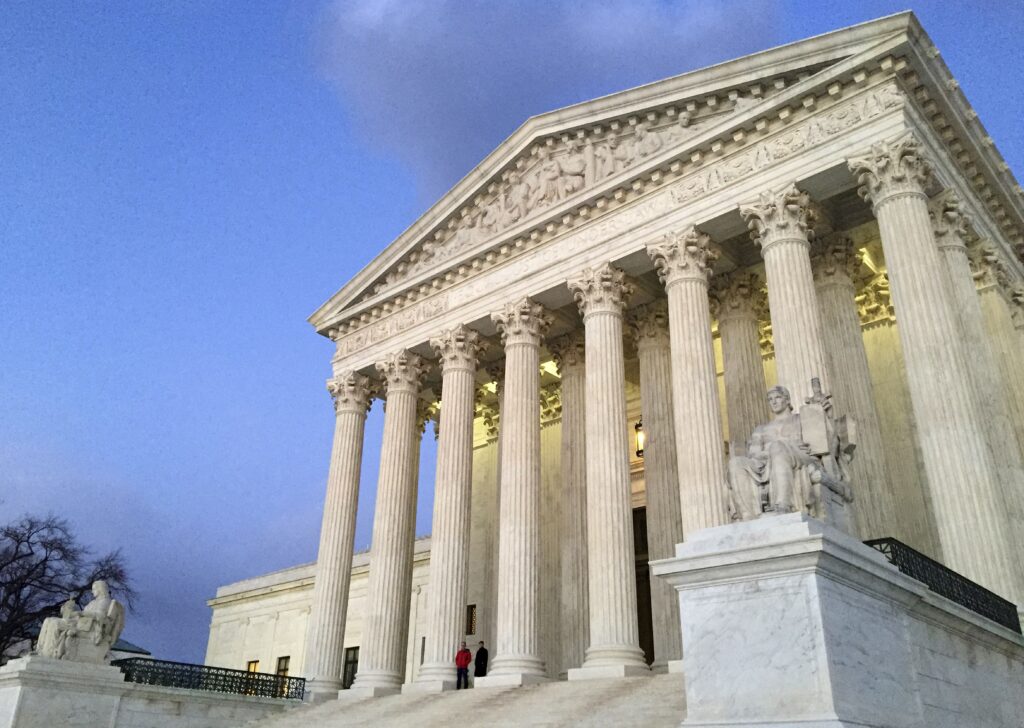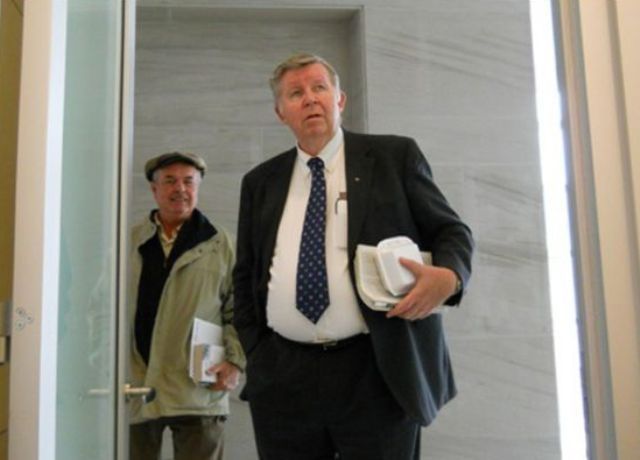‘Chutzpah’: Colorado justices raise eyebrows at Weld County’s assertion it can evade redistricting law
Members of the Colorado Supreme Court appeared incredulous on Wednesday as a lawyer for Weld County argued the jurisdiction did not need to follow the state’s redistricting law, maintained it should not have to redraw its commissioner districts for nine more years, and declined to say whether the county would even comply with a Supreme Court order.
“I’m from Brooklyn, New York. The word we’d use is ‘chutzpah,'” said Justice Richard L. Gabriel, reacting to Weld County’s assertions during oral arguments.
Although some justices were unsure whether they had the power to tell the county to redo its process in time for the 2026 election, the Colorado Attorney General’s Office argued there had to be a consequence if local jurisdictions evade their once-a-decade redistricting obligations.
“If that’s the case, then what is to stop this from happening the next time?” said Deputy Attorney General Jennifer L. Sullivan.
In 2021, the General Assembly enacted House Bill 1047, laying out requirements for counties to follow when completing their post-census redrawing of commission districts. The law applied to only a handful of counties that elect commissioners by district, and provided direction for holding hearings, producing alternate maps and maximizing politically competitive districts.
Two local civic groups — the League of Women Voters and the Latino Coalition of Weld County — along with two voters filed suit following the adoption of Weld County’s new district maps in 2023. They pointed out the jurisdiction had not followed HB 1047, under the belief that its home rule status meant it only needed to comply with the redistricting provisions of its own charter.

Weld County Board of Commissioners on Jan. 4, 2021.
In a March 2024 order, District Court Judge Todd Taylor agreed the county “failed to meet nearly every procedural requirement” the legislature imposed. He further found the General Assembly did intend for HB 1047 to apply to Weld County and its charter did not excuse it from following state law.
Recognizing Weld County would not likely have enough time to properly draw its commission districts this year, Taylor allowed the board to use its pre-2023 map temporarily. The county and the plaintiffs both filed appeals with the Court of Appeals, but the plaintiffs petitioned the Supreme Court to stage a rare intervention and immediately hear the case itself.
The charter v. the constitution
The Colorado Constitution allows home rule counties to set up the “organization and structure” of their county functions via a charter. On the subject of redistricting, Weld County’s charter only provides that there be three commissioner districts and that the county board shall revise the boundaries no more than every two years to ensure the populations are roughly equal.
At the same time, the charter obligates the board to fulfill any duties “that may hereafter be required or permitted by State law.”

(From left) Colorado Supreme Court Justice Brian D. Boatright, Chief Justice Monica M. Márquez and Justice William W. Hood III listen to arguments from Assistant Attorney General Caitlin E. Grant during the People v. Rodriguez-Morelos case as part of Courts in the Community at the Wolf Law building at University of Colorado Boulder on Thursday, Oct. 24, 2024. The semi-annual event entails the Colorado Supreme Court hearing arguments before an audience of students throughout the state. (Stephen Swofford, Denver Gazette)
To the plaintiffs, Weld County’s duty was clear: Follow the state’s redistricting requirements, which do not conflict with the existing guideposts in the charter.
“The board wants the power to choose its voters, rather than give voters the power to choose their government,” attorney Kendra N. Beckwith told the Supreme Court. “This is not what democracy looks like. This is not what home rule looks like. And the board’s self-interested process is not what redistricting looks like in this state.”
Sullivan, who also argued in support of the plaintiffs, drew the court’s attention to the board’s decision to split Greeley, the most populous city with a large Hispanic population, between the three commission districts.
The board’s deviation from the transparency requirements in state law left no way to “rebut a belief or conclusion that the map was drawn that way for partisan reasons or to disenfranchise some voters,” she said.

The city of Greeley, Colo., split between three Weld County commissioner districts. Source: League of Women Voters of Greeley, Weld County, Inc. v. Board of County Commissioners
“I will confess that I’ve been scratching my head a little bit around that remedy,” said Chief Justice Monica M. Márquez, who noted the plaintiffs did not argue the maps themselves were unfair. “Help me understand how the court has authority to require compliance with a deadline that has long since passed” in 2023.
‘They know it’
In contrast, members of the court were far more skeptical of Weld County’s justifications for redrawing its districts without regard to HB 1047. Justice Melissa Hart wondered how the county’s constitutional ability to set up the “organization and structure” of its government gave it license to ignore redistricting steps.
“Organization and structure of county government, it seems to me, is about an org chart. Who does what within the government,” she said. “This is not about the organization of the Weld County government.”

FILE PHOTO: From left, Colorado Supreme Court Justices William W. Hood III, Melissa Hart and Maria E. Berkenkotter listen to an argument during a Courts in the Community session held at Pine Creek High School in Colorado Springs on Thursday, Nov. 17, 2022. (The Gazette, Parker Seibold)
“How do you get around your own charter,” added Gabriel, “that says commissioners shall exercise powers and perform all duties that may be required by state law?”
The redistricting requirements “force on the county how to do something which the county already provided for in its own home rule charter,” responded attorney Alexandria L. Bell. “And now what we are being asked to do is to actually be forced to follow how-to procedures that are not in the charter.”
She said that Weld County, which was part of an unsuccessful secession attempt in 2013, “does not have a duty to its citizens to follow” the redistricting law. If voters wanted such a process, they could amend the charter to include one.
“But what would that vote look like?” interjected Gabriel. “The referendum would be a vote on whether the people of Weld County have to follow the ruling of the Colorado Supreme Court? With all respect, I don’t think the people of Weld County have that right.”
Justice Carlos A. Samour Jr. wondered if Weld County could feasibly comply with the redistricting law in time for the 2026 election, if the court were to rule in the plaintiffs’ favor.
“I’m assuming you would try to comply with our order,” he added.
Bell did not say whether the county would comply, only that the charter permits boundary adjustments in two-year increments.
“I’m not sure if I answered your question,” she said.
“I’m not sure if you did, either,” Samour replied.
Rep. Chris deGruy Kennedy, D-Lakewood, who sponsored HB 1047, said he found it “unbelievable” that Weld County refused to follow the law. He shared with Colorado Politics a 2021 email from Republican Commissioner Perry Buck in which she promised to “do all I can” to kill the legislation.
“Yes, I absolutely intended the law to apply to Weld County, and they know it,” deGruy Kennedy said.
The case is League of Women Voters of Greeley, Weld County, Inc. et al. v. Board of County Commissioners.











